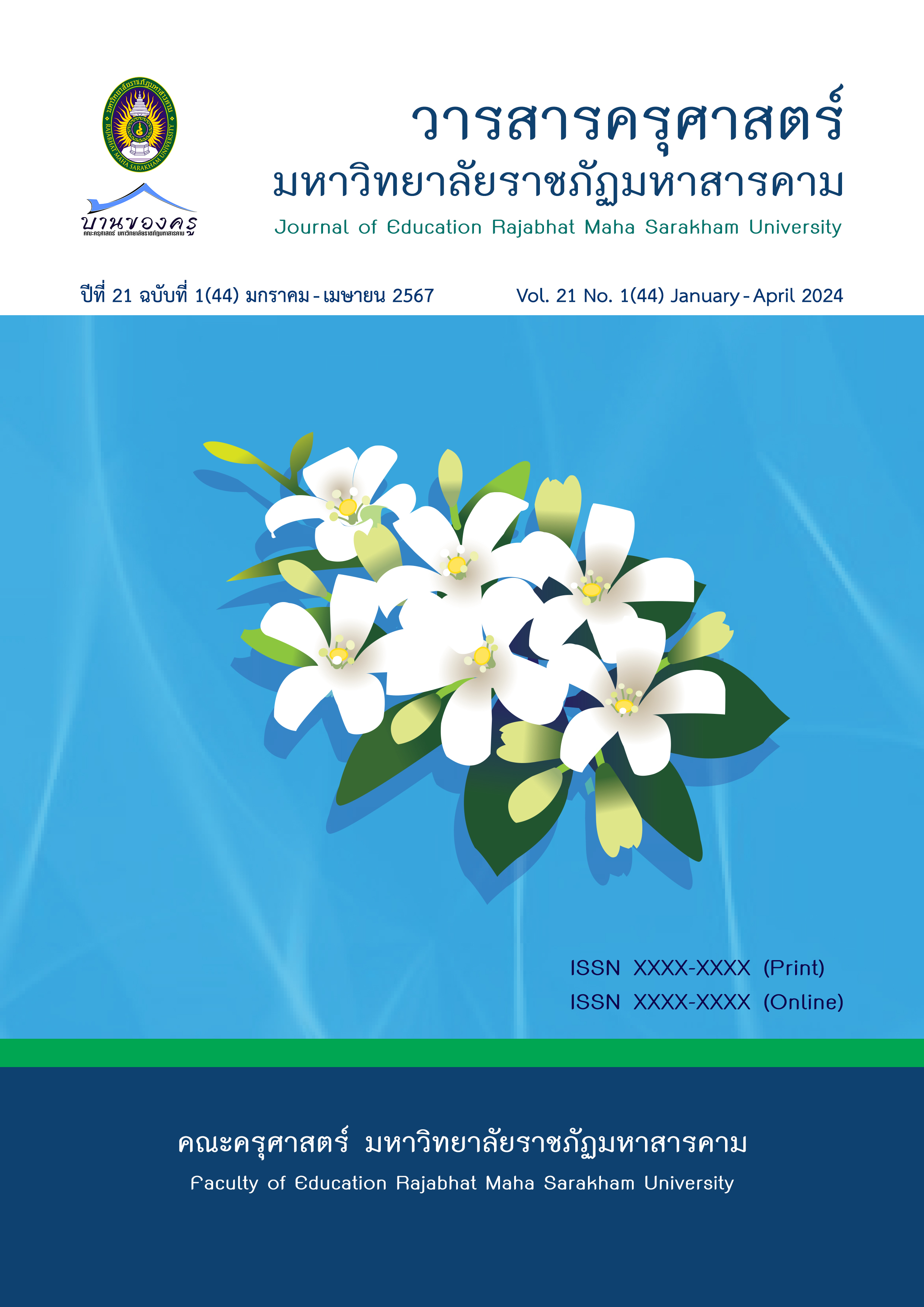Thailand education in the digital era
Main Article Content
Abstract
Management of education in the digital era is challenging among students who have been modern since birth. The evolving environment and learning resources are progressive. As a result of the changing world circumstances, teaching is changing with increasing factors, such as traditional teaching, the materials and equipment. Currently, traditional teaching management may not respond to the policies of the country. Therefore, the factors or components that will make the management of teaching effectively, it is concerns with school administrators to give the importance and have an administrative vision of the digital era. In addition to teachers, they need to have digital capabilities. development, instructional design, effective learning activities and new learning development using digital technology to play the role in their works. At the same time, students need to respond to teaching facilities that need to be competent in the field of digital technology. The importance of the results of good educational management in the digital era is only to determine the quality of education.
Article Details

This work is licensed under a Creative Commons Attribution-NonCommercial-NoDerivatives 4.0 International License.
ข้อกำหนดเบื้องต้นที่ผู้นิพนธ์(ผู้ส่งบทความ) ควรทราบ
1. ผู้นิพนธ์ที่ประสงค์จะลงตีพิมพ์บทความกับวารสาร ตั้งแต่เดือนมกราคม 2563 เป็นต้นไป ให้ใช้รูปแบบใหม่ (Template 2563) โดยสามารถดูตัวอย่างได้ที่เมนู GUIDELINES
2. จะตีพิมพ์และเผยแพร่ได้ ต้องผ่านการประเมินจากผู้ทรงคุณวุฒิ (Peer Review)
3. การประเมินบทความโดยผู้ทรงคุณวุฒิ (Peer Review) เป็นแบบ Double Blind
4. การอ้างอิงบทความใช้หลักเกณฑ์ APA (American Psychological Association) คลิก
5. บทความถูกปฏิเสธการตีพิมพ์ ไม่ผ่านการประเมิน ผู้นิพนธ์ขอยกเลิกเองหรือชำระเงินก่อนได้รับการอนุมัติ ทางวารสารไม่มีนโยบายการคืนเงิน
References
กระทรวงศึกษาธิการ (2564). แผนปฏิบัติการดิจิทัลเพื่อการศึกษา กระทรวงศึกษาธิการ (พ.ศ. 2563-2565). ศูนย์เทคโนโลยีสารสนเทศและการสื่อสาร สป (ฺBICT). https://bict.moe.go.th/wp-content/uploads/2022/03/digital-63-65.pdf
จุฬาลักษณ์ โสระพันธ์. (2564, 17 มีนาคม). บทบาทของผู้บริหารการศึกษายุคดิจิทัล. ศูนย์พัฒนาและประยุกต์วิชาการ. https://adacstou.wixsite.com/adacstou/single-post/บทบาทของผ-บร-หารการศ-กษาย-คด-จ-ท-ล
ธัญญาภรณ์ นาจำปา. (2564). การพัฒนารูปแบบการบริหารสถานศึกษาในยุคดิจิทัล สำหรับโรงเรียนมัธยมศึกษา [วิทยานิพนธ์ปริญญาดุษฎีบัณฑิต]. DSpace at Srinakharinwirot University. http://ir-ithesis.swu.ac.th/dspace/bitstream/123456789/1876/1/gs601150038.pdf
ธนวัตน์ พูลเขตนคร, นิตยา นาคอินทร์ และพิชญาภา ยวงสร้อย. (2564). การออกแบบและพัฒนาสื่อการเรียนรู้ออนไลน์เพื่อตอบสนองพฤติกรรมการเรียนของผู้เรียนในยุคดิจิทัล. วารสารการบริหารนิติบุคคลและวัฒนธรรมท้องถิ่น, 7(5), 327-335.
วิจารณ์ พานิช. (2555). วิถีสร้างการเรียนรู้เพื่อศิษย์ในศตวรรษที่ 21. มูลนิธิสดศรี-สฤษดิ์วงศ์.
พระปลัดสามารถ จนฺทสาโร (สิงห์รักษ์), วัฒนะ กัลยาณ์พัฒนกุล และ วรกฤต เถื่อนช้าง. (2565). คุณลักษณะที่พึงประสงค์ของครูในยุคดิจิทัลตามแนวทางพระพุทธศาสนา. วารสารวิจยวิชาการ, 5(4), 35-44. https://doi.org/10.14456/jra.2022.82
พระครูสุตวรธรรมกิจ และ พระมหาพงศ์ทราทิตย์ สุธีโร. (2563). การพัฒนาครูไทยสู่ศตวรรษที่ 21. วารสารบัณฑิตสาเกตปริทรรศน์, 5(2), 19-30.
โพสต์ทูเดย์. (2562, 29 เมษายน). เข้าใจความต่างคน 4 เจเนอเรชั่น ทลายช่องว่างเพื่อการทำงานที่แฮปปี้. PostToday. https://www.posttoday.com/lifestyle/587633
สุวดี อุปปินใจ และ พูนชัย ยาวิราช. (2562). การจัดการชั้นเรียนยุคดิจิทัล. วารสารสมาคมพัฒนาวิชาชีพการบริหารการศึกษาแห่งประเทศไทย, 1(4), 51-65.
สำนักงานพัฒนารัฐบาลดิจิทัล (องค์การมหาชน). (2562). AI เทคโนโลยีปัญญาประดิษฐ์สำหรับการบริหารงานและการบริการภาครัฐ. บริษัท ส.พิจิตรการพิมพ์ จำกัด.
อติพร เกิดเรือง. (2560). การส่งเสริมการเรียนรู้ในศตวรรษที่ 21 เพื่อรองรับสังคมไทยในยุคดิจิทัล. วารสารมหาวิทยาลัยราชภัฎลำปาง, 6(1), 173-184.
Beck, I. L., McKeown, M., & Kucan, L. (2002). Choosing words to teach. In Bringing Words to Life: Robust Vocabulary Instruction (15-30). Guilford Press.
Juke, I. (2013). Understanding digital children. Retrieved February 15, 2013, Retrieved from: http://edorigami.wikispaces.com/Understanding+Digital+Children+Ian+Jukes
Kaganer, E., S. & Zamora, J. (2014). The 5 key to a digital mindset. IESE. Retrieved from: https://www.forbes.com/sites/iese/2014/03/11/the-5-keys-to-a-digital-mindset/?sh=7f8eaca72ee0
Prensky, M. (2012). From Digital Natives to Digital Wisdom: Hopeful Essays for 21st Century Learning. doi:10.4135/9781483387765 UNESCO. (2006). “Education for All Global Monitoring Report 2007: Strong Foundations - Early Childhood Care and Education.” Retrieved from: https://unesdoc.unesco.org/ark:/48223/pf0000142326
Waugh. (2011). 21st Century Classroom. Retrieved February 6, 2017, Retrieved from: http://mswaughsclass.blogspot.com/2011/04/21st-century-classroom.html


